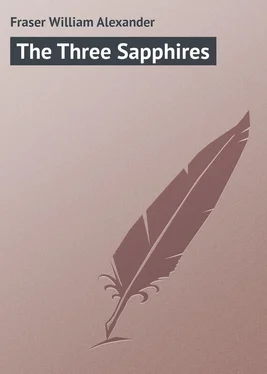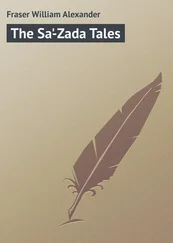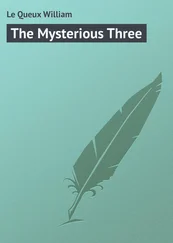William Fraser - The Three Sapphires
Здесь есть возможность читать онлайн «William Fraser - The Three Sapphires» — ознакомительный отрывок электронной книги совершенно бесплатно, а после прочтения отрывка купить полную версию. В некоторых случаях можно слушать аудио, скачать через торрент в формате fb2 и присутствует краткое содержание. Жанр: foreign_prose, Зарубежные любовные романы, на английском языке. Описание произведения, (предисловие) а так же отзывы посетителей доступны на портале библиотеки ЛибКат.
- Название:The Three Sapphires
- Автор:
- Жанр:
- Год:неизвестен
- ISBN:нет данных
- Рейтинг книги:4 / 5. Голосов: 1
-
Избранное:Добавить в избранное
- Отзывы:
-
Ваша оценка:
- 80
- 1
- 2
- 3
- 4
- 5
The Three Sapphires: краткое содержание, описание и аннотация
Предлагаем к чтению аннотацию, описание, краткое содержание или предисловие (зависит от того, что написал сам автор книги «The Three Sapphires»). Если вы не нашли необходимую информацию о книге — напишите в комментариях, мы постараемся отыскать её.
The Three Sapphires — читать онлайн ознакомительный отрывок
Ниже представлен текст книги, разбитый по страницам. Система сохранения места последней прочитанной страницы, позволяет с удобством читать онлайн бесплатно книгу «The Three Sapphires», без необходимости каждый раз заново искать на чём Вы остановились. Поставьте закладку, и сможете в любой момент перейти на страницу, на которой закончили чтение.
Интервал:
Закладка:
"What do you want, Lumbani?" Finnerty queried.
"Yes, sahib, I am a Banjara of the Lumbani caste. The sahib who is so strong is also wise in the ways of my people."
"I wonder what this will cost me in wasted time," the major lamented in English. "I judge his soul is weighted with matters of deep import." Then, in Hindustani: "That's a true Banjara dog, Lumbani."
"Yes, sahib, he is one of that great breed. Also in the sahib's hands are two thoroughbred Rampores; they be true dogs of the Tazi breed, the breed that came from Tazi who slept by the bedside of Nawab Faiz Mahomed five generations since. The sahib must be in high favour with the Nawab of Rampore, for such dogs are only given in esteem; they are not got as one buys bullocks."
"What is it you want?" queried Finnerty.
The Banjara looked at Swinton; he coughed; then he loosened the loin cloth that pinched at his lean stomach.
"This dog, sahib – Banda is the noble creature's name – has the yellow eyes that Krishna is pleased with; that is a true sign of a Banjara." He held out his hand, and Banda came up the steps to crouch at his side.
At this intrusion of the native's dog, the patrician Rampores sprang the full length of their leash with all the ferocity that is inherent in this breed. A pariah dog would have slunk away in affright, but the Banjara's yellow eyes gleamed with fighting defiance; he rose on his powerful, straight legs, and his long fangs shone between curled lips.
"Good stuff!" Finnerty commented, and to his groom added: "Take the hounds away. He's a sure-enough Banjara, Swinton," he resumed in English. "Look at that terrier cast in the face, as though there were a streak of Irish or Airedale in him."
Indeed, the dog was a beauty, with his piercing bright eyes set in the long, flat head that carried punishing jaws studded with strong teeth. The neck was long, rising from flat, sloping shoulders, backed up by well-rounded ribs and arched loins leading to well-developed quarters. The chest was narrow and deep, and the flanks tucked up.
"They're game, too," Finnerty declared. He turned to the owner. "Will Banda tackle a panther?"
"He and his sons have been in at the death of more than one; they will follow a leopard into a cave."
"How much will you take for him?" Swinton asked.
The native looked his scorn. He turned to Finnerty as though his sarcasm might be wasted upon this sahib who thought a Banjara would sell one of the famous breed. "Perhaps the strange sahib will go to Umar Khan, at Shahpur, and buy one of the Salt Range horses – a mare of the Unmool breed. When he has I will sell him Banda."
Swinton laughed, and, taking a rupee from his pocket, passed it to the native, saying: "Food for Banda. The sarcasm was worth it," he added in English, "an Unmool mare being above price."
"All this talk of the dogs," Finnerty declared, "is that our friend has something on his mind. He was studying you, but you've broken the ice with your silver hammer."
The native salaamed, tucked the rupee in his loin cloth, and the questioning, furtive look that had been in his eyes disappeared. He turned to the major:
"Huzoor, I am a man of many buffaloes, robbing none, going in peace with my herds up into the hills in the hot weather when the new grass comes green and strong from the ashes of the fire that has been set out in the spring, and coming back to the plains when the weather is cold."
"Where is your country?" Finnerty queried.
"Where my grain bags and my cooking pots are is my country, my fathers holding that all lands were theirs to travel in. For fifteen years in this moon have I remained down yonder by the river with my herd, just where the heavy kagar grass makes good hunting for tiger, and always on good terms of friendship with him."
"Gad! I thought so," Finnerty ejaculated. "We'll get news of a kill in a minute."
"If we met in the path – that is, your slave and tiger – I would say: ' Khudawand , pass here, for the thorns in the bush are bad for thy feet,' and if tiger was inclined he would pass, or he would turn. Often lying on the broad back of a buffalo as we crossed where the muck is deep I would see tiger lying in wait for pig or chinkara, and I would call, ' Kudawand , good hunting!' Then what think you, sahib, if after years of such living in peace, this depraved outcast, begotten of a hyena, makes the kill of a cow?"
"A tiger, like a woman, is to be watched," Finnerty declared, quoting a tribal adage.
"And all in the way of evil temper, sahib, for the cow lies yonder with no mark beyond a broken neck, while in the jungles rajah tiger is growling abuse. A young cow, sahib, in full milk. For the sake of God, sahib, come and slay the brute."
The Banjara had worked himself into a passion; tears of rage stood in his eyes. "And to think that I had saved the life of this depraved one," he wailed.
"You saved the tiger's life, Lumbani?"
"Surely, sahib. Of the Banjaras some are Mussulmans – outcasts that lot are – and some are Hindus, as is your servant, so we are careful in the matter of a kill, lest we slay one of our own people who has returned. This slayer of my cow always took pleasure in being near the buffalo. Why, huzoor, I have seen him up in the hills looking as though he had felt lonesome without the herd. Noting that, it was in my mind that perhaps a Banjara herdsman had been born again as a tiger. That is why I saved his life from the red dogs of the jungle; nothing can stand before them when they are many. From the back of a buffalo I saw one of these jungle devils standing on high ground, beckoning, with his tail stuck up like a flag, to others of his kind."
"I've seen that trick," Finnerty commented.
"The tiger had been caught in a snare of the Naga people as he came to partake of a goat they had tied up, as he thought, for his eating; the sahib knows of what like a snare is to retain a tiger. A strong-growing bamboo, young and with great spring, had been bent down and held by a trip so that tiger, putting his paw in the noose, it sprang up, and there he was dancing around like a Nautch girl on the rope that held his wrist, being a loose bamboo too big for a grip of his teeth; it spun around on the rope. The red dogs, hearing his roars, knew he was trapped, and were gathering to settle an old dispute as to the eating of a kill. They would have made an end of him. A mongoose kills a cobra because he is too quick for the snake, and they were too quick for the tiger; so, taking pity upon him as an old friend, with my staff I drove them off; then, climbing into the bamboos, cut the rope."
"Did you tackle them alone, Lumbani?"
"Surely, sahib; jungle dogs run from a man that is not afraid."
Finnerty's shikarri, Mahadua the Ahnd, who had come to the verandah, now said: "The tiger this herder of buffalo tells of is 'Pundit Bagh;' he is well known to all."
"And you never brought word that we might make the hunt," Finnerty reproached.
"Sahib, we Ahnd people when we know a tiger is possessed of a spirit do not seek to destroy that one."
"Why is he called Pundit? Is he the ghost of a teacher?"
"This is the story of Pundit Bagh, sahib: Long ago there was a pundit that had a drug that would change him into an animal, and if he took another it would change him back again."
The Ahnd's little bead eyes watched his master's face furtively.
"One day as the pundit and his wife were walking through the jungle a leopard stepped out in the path to destroy them. He gave his wife one powder to hold, saying: 'I will take this one and change into a tiger, and when I have frightened the leopard away give me the other that I may change back to myself.' But the poor woman when she saw her tiger husband spring on the leopard dropped the powder and ran away; so the pundit has remained a tiger, and is so cunning that it will be small use to make the hunt."
Читать дальшеИнтервал:
Закладка:
Похожие книги на «The Three Sapphires»
Представляем Вашему вниманию похожие книги на «The Three Sapphires» списком для выбора. Мы отобрали схожую по названию и смыслу литературу в надежде предоставить читателям больше вариантов отыскать новые, интересные, ещё непрочитанные произведения.
Обсуждение, отзывы о книге «The Three Sapphires» и просто собственные мнения читателей. Оставьте ваши комментарии, напишите, что Вы думаете о произведении, его смысле или главных героях. Укажите что конкретно понравилось, а что нет, и почему Вы так считаете.












